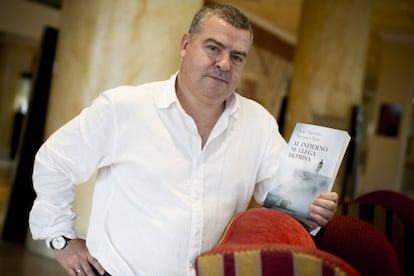From the courtroom to crime novel
Magistrate under fire for including details of Asunta Basterra murder case in new book


When investigating magistrate José Antonio Vazquéz Taín decided to turn his hand to novel writing, he took his inspiration from some of the high-profile cases he has worked on, several of which have made national headlines. For example, his first book, La leyenda del santo oculto (or, The legend of the hidden saint), is based on the 2012 theft of the Codex Calixtinus, a medieval manuscript stolen from the cathedral in Santiago de Compostela, which was discovered hidden in the garage of a former church employee. The rights to the book have already been bought by Galicia’s regional television channel and a mini-series has been filmed, although the case has yet to be heard in court.
Now, Vázquez is back with Al infierno se llega deprisa (or, It’s a short trip to hell), which has echoes of the Asunta Basterra case, involving the murder of the 12-year-old adopted girl, whose parents have been accused of the killing and are in jail awaiting trial.
The book is the first of a trilogy to be brought out by the country’s leading publisher, Planeta. Over the course of its 300 or so pages, a couple is murdered and their bodies dismembered, while their 13-year-old daughter is kidnapped but is able to send a message to a friend. There is also a female lawyer – Vazqúez’s wife in reality – as well as ambition, sex, some thoughts on a judicial system that doesn’t work, widespread corruption, and courts struggling to cope with an ever-larger workload under “19th-century conditions.”
The book uses the real names of several Civil Guard officers who were involved in the investigation
The former judge says that the story has “nothing to do” with the Asunta Basterra case, and that he wasn’t pressured by his publishers to include any references to the murder. That said, he uses the real names of several Civil Guard officers who were involved in the investigation.
“Planeta read my first book, and saw a lot of potential there, even though I was a first-time writer. They later called me to ask if I wanted to write another, but they didn’t want a historical novel. Instead they asked for a crime story, but not necessarily focused on drug trafficking,” he says.
“The idea was to publish in January 2015, but I started writing in April of this year and by June I had the first draft,” he says. The book went on sale on September 23, delayed because the publishers wanted to wait until after the 22nd, a year to the day after Asunta Basterra’s body was found. “Because of that, I will be the last at Planeta to launch my book. Ken Follet has already presented his. Everybody has. And we have lost the chance to occupy the best spots in the book shops,” says Vázquez Taín.
The judge has moved on from the Santiago courthouse, and is now a magistrate in A Coruña, also in Galicia. Outside of the legal profession, he is spending his time on the promotion of his new book, the first edition of which sold out in two days. But despite his success he is also the constant target of criticism – something to which he has apparently become accustomed. The lawyer of Rosario Porto, Asunta’s adoptive mother, describes the choice of date of the launch of the book as “repugnant,” while other magistrates from Galicia have called the novel “opportunitstic,” “unethical” and “heartless.”
The trial of Asunta Basterra’s parents is due to begin in October.
Tu suscripción se está usando en otro dispositivo
¿Quieres añadir otro usuario a tu suscripción?
Si continúas leyendo en este dispositivo, no se podrá leer en el otro.
FlechaTu suscripción se está usando en otro dispositivo y solo puedes acceder a EL PAÍS desde un dispositivo a la vez.
Si quieres compartir tu cuenta, cambia tu suscripción a la modalidad Premium, así podrás añadir otro usuario. Cada uno accederá con su propia cuenta de email, lo que os permitirá personalizar vuestra experiencia en EL PAÍS.
¿Tienes una suscripción de empresa? Accede aquí para contratar más cuentas.
En el caso de no saber quién está usando tu cuenta, te recomendamos cambiar tu contraseña aquí.
Si decides continuar compartiendo tu cuenta, este mensaje se mostrará en tu dispositivo y en el de la otra persona que está usando tu cuenta de forma indefinida, afectando a tu experiencia de lectura. Puedes consultar aquí los términos y condiciones de la suscripción digital.








































